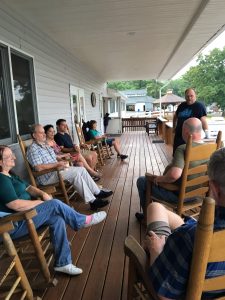 When the Lord gives us the new birth from above, he calls us individually to himself. However, he does not save us to be individuals, but to belong to his people, his new family. In this way, our lives are forever intertwined, not only with the Triune God, but with each other!
When the Lord gives us the new birth from above, he calls us individually to himself. However, he does not save us to be individuals, but to belong to his people, his new family. In this way, our lives are forever intertwined, not only with the Triune God, but with each other!
The idea of “one another” is at the core of the true Christian way of life. We are to express this partnership in many ways. Today, I decided to provide a list of the twenty-seven various kinds of one another relationships everyone who follows Jesus should be developing with others. The actions listed below make up a very significant part of what it means to follow Christ. To neglect these actions is to miss what the Christian life really is!
- Love one another (Jn 13:34-35; 15:12, 17; Rm 13:8; 1 Th 3:12; 4:9; Heb 13:1; 1 Pt 1:22; 4:8; 1 Jn 3:11, 23; 4:7, 11, 12; 2 Jn 1:5)
- Encourage one another (Rm 1:12; 1 Th 4:18; 5:11; Heb 3:13; 10:25)
- Be devoted to one another (Rm 12:10)
- Honor one another (Rm 12:10)
- Live in harmony with one another (Rm 12:16; 1 Pt 3:8)
- Instruct (admonish) one another (Rm 15:14; Col 3:16)
- Greet one another with a holy/loving kiss (Rm 16:16; 1 Cor 16:20; 2 Cor 13:12; 1 Pt 5:14)
- Agree with one another (1 Cor 1:10; Ph 4:2)
- Serve one another (Gal 5:13)
- Bear with one another (Eph 4:2; Col 3:13)
- Be kind to one another (Eph 4:32; 1 Th 5:15)
- Be compassionate to one another (Eph 4:32)
- Forgive one another (Eph 4:32; Col 3:13)
- Speak to one another with psalms, hymns and spiritual songs (Eph 5:19)
- Submit to one another (Eph 5:21)
- Spur on one another (Heb 10:24)
- Offer hospitality to one another (1 Pt 4:9)
- Clothe yourself with humility toward one another (1 Pt 5:5)
- Wait for one another (1 Cor 11:33)
- Have equal concern for one another (1 Cor 12:25)
- Build up one another (Rm 14:19; 1 Th 5:11)
- Confess your sins to one another (Js 5:16)
- Pray for one another (Js 5:16)
- Think the same thing with one another (Rm 15:5)
- Accept one another (Rm 15:7)
- Bear one another’s burdens (Gal 6:2)
- Consider one another better than oneself (Ph 2:3)
Comments on the above list:
- Some of these “one another” imperatives and exhortations can be done in large public gathering, but only in a very limited sense.
- Most of these require you to be an active part of a small group or accountability group or one on one situations in order to fulfill the expectations. You cannot do these alone!
- As you can see, the practice of these one another imperatives and exhortations will transform our church experiences. They will become much more than sitting in a big room with others. We will share a rich and joyful experience of life.
Grace and peace, David

 1 Thessalonians 5:11
1 Thessalonians 5:11 In our Sunday morning gathering, we aim to read through a passage of Scripture together each week. For example, we have read through Colossians five times in a week and the book of Hebrews once. Last week and this, our goal is to read through the Gospel of Matthew together. Although I don’t have a text of Scripture to back up this method, I think it is wise for groups of Christ learners (disciples) to be reading together. It draws our thinking to the same portions of the Scriptures and provides material for discussion or reference.
In our Sunday morning gathering, we aim to read through a passage of Scripture together each week. For example, we have read through Colossians five times in a week and the book of Hebrews once. Last week and this, our goal is to read through the Gospel of Matthew together. Although I don’t have a text of Scripture to back up this method, I think it is wise for groups of Christ learners (disciples) to be reading together. It draws our thinking to the same portions of the Scriptures and provides material for discussion or reference.